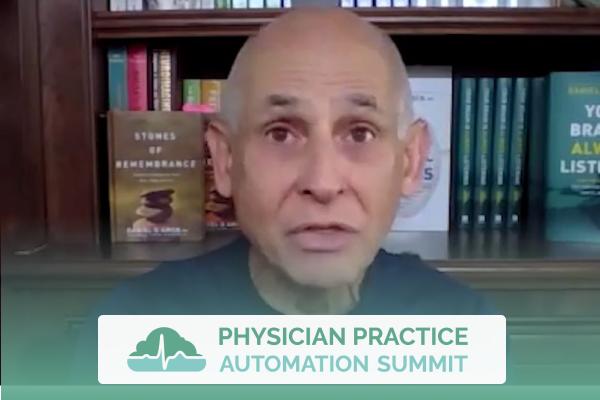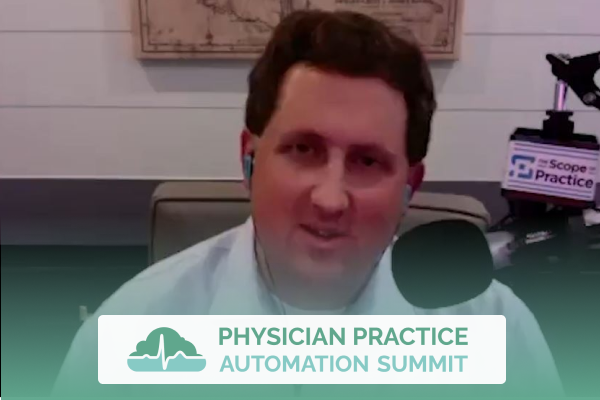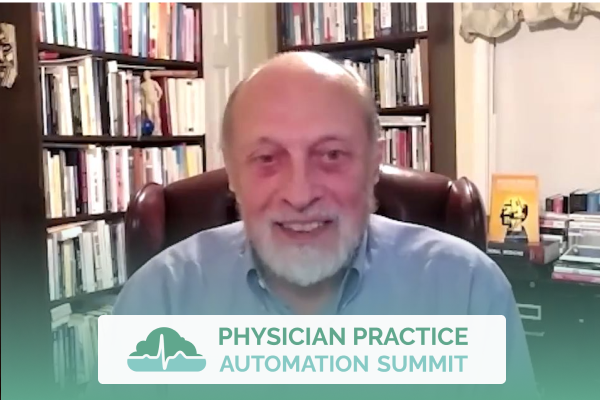Join the discussion below
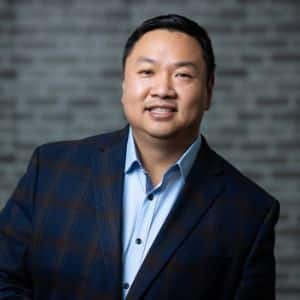
Dr. Ruan is the Founder and CEO of Texas Center for Lifestyle Medicine. He devotes his career in practicing and building systems that allow for efficient delivery of healthcare. He is a board certified internal medicine physician but also have advised with companies to improve their workflow, company culture, marketing,... Read More
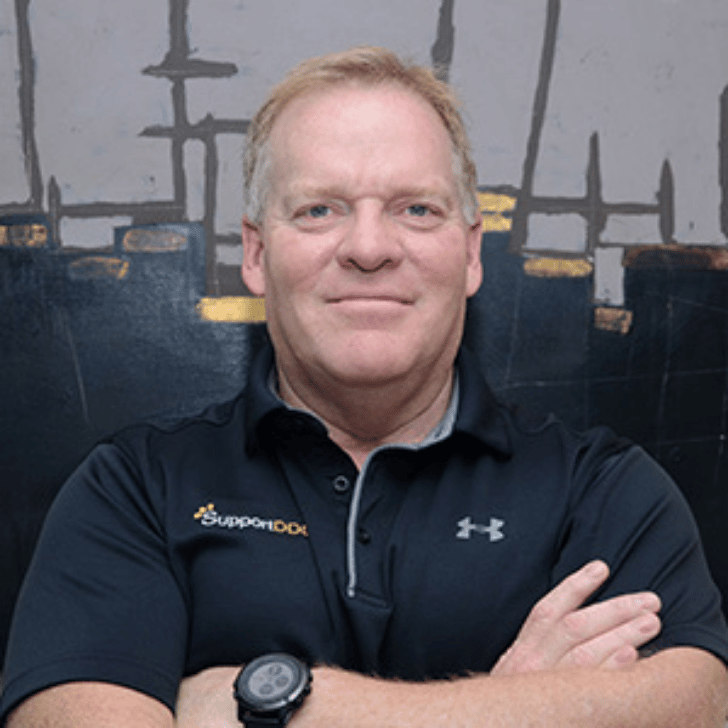
J.W Oliver is a visionary leader, entrepreneur, and philanthropist. He was born in Evreux, France, and is the proud son of a USAF Veteran and an awesome mom. He grew up in a poor family but was raised by a supportive and loving family that nurtured him from the reality... Read More
Cheng-Huai Ruan, M.D.
Everyone, I have someone really special with me today. I’ve known this guy for a few years now. Because we use this company actually at Texas Center for Lifestyle Medicine. He’s the Managing Partner and Founder of ZimWorX and also he runs supportdoctors.com, so supportdrs.com. Is that what it is?
JW Oliver Jr.
Yeah, that’s right, that’s right.
Cheng-Huai Ruan, M.D.
So you wanna check it out, but he is a man on a mission. And when we talk about a mission, we’re not just talking about something small. We’re talking about something big here. And he has a really featured group of very valuable people. And we find to be huge assets to our company in a country that’s totally unexpected, totally unexpected. But we have such a good time, and, you know, I asked him to come on to really talk about the mission behind the project, but also how does this fit perfectly into where private practices are going, you know, in the pandemic era and moving forward. So welcome to the summit, appreciate it.
JW Oliver Jr.
Yeah, so appreciate you having me here, Ruan, and talk a little bit about what we do. And you’re right, I mean, our main objective when we founded was it all started, my partner and I got together. He’s from Zimbabwe. You mentioned about where it’s at, so it’s Zimbabwe, and it’s the last letter in the alphabet with a country of, you know, past Zambia and way down in near South Africa. Most people are not sure where it’s at, but the uniqueness that it has is you have these amazing individuals who speak the Queen’s English.
So we say they’ve got the London accent, which was from their early occupancy. And that just changed in the last 30 years, 40 years. And so you have this amazing country where you’ve got a high unemployment, but amazing with- You know, the really differentiator is that parents put a large emphasis that they get a university education. So about 98% of our team members that we have in various channels all have university education. So they speak the Queen’s English. And for us, at the ministry, when a country has 80% unemployment, we’re putting people to work. So that’s really our method behind our madness, if you will.
Cheng-Huai Ruan, M.D.
Yeah, and it’s actually for us, it’s actually working out pretty wonderful. And so, you know, but let’s talk about Zimbabwe for a second ’cause there’s a big question mark in most people’s heads, and me as well when we first started talking a few years ago. So why Zimbabwe in particular?
JW Oliver Jr.
Well, I was actually at a Christian conference about five years ago and I ran into my now partner who’s from Zimbabwe. So that was the reason we ended up there. And so it was a little bit coincidence and we stayed in contact. He was not in this type of business. I’ve been in the imaging business for the last 30 years and he had been in the food business, and so we just both had a heart to help people. He said, hey, how can we help the people of Zimbabwe? Which is his home country. And so in a very unique way, he’s from Zimbabwe, and I’m from the US, but I ended up being the managing partner and I spend most of the time at the office there in Africa as well. But it was a unique opportunity and a unique experience to showcase their talents, which is quite different as you know from the other places where you can have virtual assistance and outsourcing in different countries as well.
Cheng-Huai Ruan, M.D.
Yeah, and the culture’s quite different and the work ethic is also fabulous and quite different as we experience as well. But let’s like walk through the path a little bit, ’cause you guys started more in dentistry, right, and then now move on to doctors?
JW Oliver Jr.
Yeah, actually we started with the generic thinking that we would just supply people with workers. And I started with my imaging company. I said, you know, I could use some accounting people and some logistics people. Started out with two or three and then a good friend of mine who’s a dentist, and as a matter of fact was our first dental customer, came to us four years ago and said, hey, can you do this specific task? And it was some insurance verification collections and coding and we said, well, I think so. And that just exploded. So the SupportDDS became a channel that’s one of our largest. We do a lot in the real estate, and then the, you know… You’ve helped us explore and expand in the medical side. And we believe that is one of the larger areas and that’s where our support doctors, our supportdrs.com kinda came about.
Cheng-Huai Ruan, M.D.
Yeah, logistically speaking, can you kinda explain how the most successful practices are actually utilizing the virtual assistants from your company?
JW Oliver Jr.
You know, it’s interesting, when you think of remote virtual team members, most people will automatically drift to low level data entry kind of repetitive task things that they could do. And we do a lot of that. We’ve got a number of those, but we’ve got companies that have… Literally we have one company that has their, what they call their CFO. Who’s a large financial analyst that does all their breakdowns for a dental cooperative that has about 30 offices. And he’s actually head over there. We’ve got people doing marketing logistics in the medical side. We’ve got ’em doing social media.
But interesting, one of our larger dental practices has a director of first impressions. So they literally are the first person that the patient will talk to. When they call in, they’re speaking to the director of first impressions, and we’ve now got about six people doing that. So it’s become kind of a crazy thing. We’ve got one dental office in California that has a TV set up on their front reception desk when they walk in. And when you walk in, you’re actually speaking to the girl that’s in Zimbabwe, and she’s seeing you live on the camera. So she’s checking you in virtually. So things have really changed in a lot of areas too. That’s our most unique one, but we’re seeing that being a catchy part too.
Cheng-Huai Ruan, M.D.
Unexpected, but very unique, but it makes sense, right? And so, you know, leveraging assistance and virtual assistance. Yeah, we really have to get outta the mindset a little bit. So if you got someone in the CFO position, that’s a big deal. But as you said, these people are actually, most of ’em are college graduates, right, from the universities in Zimbabwe, so they have some training and even further later on?
JW Oliver Jr.
Yeah, I mean, we’ve got a number of people that have MBAs, that have, you know, their master’s degree and even a few that had their PhDs. And what it is is Zimbabwe, being that it was a British protectorate, all of the school systems were all set up on the UK same standards. So they get a very high level of education. Even the first President Mugabe, his was all about education when they made the transition to Zimbabwe from Northern and Southern Rhodesia. So they just have a really high level of… The 54 countries in Africa, they have the number one literacy rate, and they’re always number one or two in the university education, so very high-level thinkers. And as you mentioned, the work ethic is second to none for sure.
Cheng-Huai Ruan, M.D.
Yeah, I kinda think it has been fabulous so pretty much everyone that we’ve had on our team. So let’s talk about coronavirus for a second ’cause that’s kind of a big deal these days. So I think coronavirus has really shifted the way that we think about medicine in general. So over the pandemic, there has been a huge number of turnover in employees within medical facilities. And, you know, one of the other summit members who’s Dr. Halee Fischer-Wright, who’s the head of MGMA, said that, you know, we really have to… Whenever that happens, we have to think, not about automatically just replacing these people, like a response, but more about how can we reinvent? How can we reinvent our current workflow, processes, decrease fixed costs, and to over-deliver on healthcare? And I think that’s where remote assistants shine. I really don’t wanna call ’em assistants. Remote team members really shine, you know? And so, you know, so I challenge people kind of listening to this, is that if you have vacancies or positions, stuff like that, redefine what that position really requires.
And I’m willing to bet that a good 75% of the work that’s within a practice does not need to be on location, because if you think about it, you know, I gotta pay for rent for the employees, benefits in the US, this is astronomically high. And then there’s also labor laws to adhere to and stuff like that. And so it becomes pretty complex. And so from a cost-savings perspective, you know, getting overseas assistance and stuff like that, not only is it crucial to the growth of a lot of businesses. I think it’s maybe required in the new future, especially with so much telemedicine going on, right? And a lot of practices are sort of pivoting towards that sort of mindset. And so I think that with what you got going on and with your mission and getting really high-level people and really educated people within the country, Zimbabwe, is absolutely fabulous. So let’s talk about logistics for a second. So tell me what are you kind of providing the people in Zimbabwe within the company? Do they have a place to go to work? Are they working from home? Like how is this all happening at this time?
JW Oliver Jr.
Yeah, and kind to add on to what you mentioned about reinventing, that’s what’s happening. There was a lot of hesitation when you said, you know what, I need our director of billing to be in my office, sitting in my, you know, in my desk, in my conference table. But people have started to reinvent these positions and say, you know, even the CFO position. They said, they really can gather reports. They can download reports from various offices and software, and still make those reconciliation, those analyses remotely, just the same as they would if they were working from home or even working in their own office. So I think your point’s well taken in that you have to reinvent or rethink about how you work. In terms of hours, we’ve got four floors in the high rise building in downtown Harare.
It’s the newest building, was built in 2010, 19 floors high. So everybody comes to our facility to do their work. And so we provide the desk, the computers, you know, dual monitors, any required local software, obviously like in your case with your team members. And you’ve got multiple team members there, by the way. And that, you know, if you’ve got specialty software, obviously whether it’s working in the cloud or something that needs loaded, that’s the only requirement. What they do get in our office, we have two full-time pastors that work for us. So we’re as concerned, not only about them having a job, but also about their emotional and their spiritual wellbeing as well. So we really wanna invest in them when they come into the office. And we’re in a class A building.
So for most of these being able to come to a place where you’ve got high speed internet, you’ve got really brand new surroundings. And we try to keep it a little bit Google-ish around there. So it’s a little relaxed environment where we have a young group, our average age is under 27. So you’ve got this really young, you know, group of people that are coming to work each day that you wanna have in a very comfortable space. So now one thing that we didn’t talk about is they do work just for you. You know, this is not a call center where they’re taking calls for you and three other practices. They are dedicated and only working for you, working whichever hours you have. As you and I are both on central time, so they’re working, I think for yours are probably eight to five or nine to six that they do work. So they’re 100% dedicated to your company in your office.
Cheng-Huai Ruan, M.D.
Oh, that’s great. And so, you know, working with virtual assistants, if people haven’t done it before, it’s definitely a task that you have to get used to, but once you get used to it, you’re like, how do we do this in the first place? How do we not do this in the first place, right? And I’ll tell you that… So I’ve been working with virtual assistants in several different companies, not just to practice, but in my old marketing company, in my consulting company, we have real estate virtual assistants with my real estate companies. So I’ve been working with virtual assistants for more than 10 years now. And a lot of what people don’t understand is that working with virtual assistants, sometimes you don’t know who you’re gonna get, right?
JW Oliver Jr.
Right, yeah, exactly.
Cheng-Huai Ruan, M.D.
Not only that, they may just stop or drop, you know, without notice as well. And so how does your company like screen these people, train these people and what is it about your company that makes people wanna stay and make sure that, you know, our practice is taken care of?
JW Oliver Jr.
Yeah, the difference is, is we allow you to select the individual. So we will ask you to come on board and fill out a matrix of exactly the skillset you need. Hey, I need ’em to have an accounting background, or I need ’em to have some background in collections or graphic design or web design, whatever it is you’re looking for. Then we’ll typically bring you three of the top candidates that we’ve selected. We’ll share a resume with you and we’ll do a Zoom call just like you’re doing here. You’ll actually visit with ’em, spend time, ask ’em questions. And we think there’s four key elements to keeping remote workers long time, remote team members, if you will. One is to hire correctly, which means go through the process. Don’t just say, yeah, just get me somebody. Yeah, I need somebody to work in my office, ’cause the culture can be different. And we want you to find one that fits your culture.
So hire right, train, train, train, train, train. That’s a big issue. This is just like if somebody comes into your practice and you hire ’em. You know, you don’t put ’em in a desk and say, okay, handle collections today. You’ve gotta spend time training ’em. Integrating ’em into your office and your culture. Make ’em feel a part of your team rather than just treating ’em as, you know, here’s this person who works 10,000 miles away. They’re just doing a task. Really integrate ’em into your office. And then the last part is as we say, give ’em feedback, praise ’em, give ’em feedback, let ’em know how they’re doing. So those four elements are really key with keeping and maintaining long term these remote workers in your office.
Cheng-Huai Ruan, M.D.
No, that’s great. And so let’s talk about, you know company culture for a second ’cause I think a lot of medical practices, especially going through these times are dealing with a lot of, you know, employee turnover, especially state side over here. And so I feel like the company culture can be disrupted, the practice culture can be disrupted within the practice environment. And so I’m curious about the company culture over in Zimbabwe, just really as a team at ZimWorX. So you said earlier that you really, you know, take care of these people, right? And you offer them a lot of different things and resources. So how do you keep the culture of the company elevated and happy and resourceful?
JW Oliver Jr.
Yeah, I think the first thing is, you know, as we all all know, money is not the only objective, right? It’s not the number one thing that makes somebody happy. And you can give ’em raises and raises but it doesn’t make ’em happy, so you have to… And we don’t really control the place that they work. We control the location that they work, but we don’t control who they work for, right?
Cheng-Huai Ruan, M.D.
Right, absolutely.
JW Oliver Jr.
They may work from you and they just don’t care for, that can make a disgruntled. So a few things we do to help integrate in the culture, for every 25 of our team members, we have what’s called an ARM, an account resource manager. They’re kind of a liaison and a go-between, between the office and your team member. So number one, we want ’em, if there’s a problem, you can say, you know, she’s just not coming in town. Or maybe the team member says, you know, Dr. Ruan just doesn’t explain very well to me what he wants me to do and then he gets mad at me. So they’ll try to act as a liaison to help elevate that team member’s work and their output. But secondly, we really try to create the culture within our own office.
I mentioned about the pastoral care. We do a lot with our orientation, a lot of continuing training with customer service. We do TED talks twice a week, locally to help them with issues that they’re battling within their own communities. It really is about investing in our people, investing in our team. And we have some turnover because the biggest pieces, they’re working in the evenings. Like your team members are working from 3:00 p.m. until midnight. We do provide transportation for ’em home at night. A lot of the public transportation shuts down around midnight. So we’ve got our own series of transportation that we take people all over the city. And Harare’s a big city, it’s 3 million people. So we take people a lot of different directions each day. How big is Houston? Houston’s not, what is it? Five, is Houston 5 million?
Cheng-Huai Ruan, M.D.
I don’t know if it’s a lot.
JW Oliver Jr.
That’s about half as big as Houston. It’s not as big as Houston, but it’s probably up there. But you’re right, we spend a lot of time on the onboarding process and even our pastors have to be sure and check up on each person at least once a quarter, just to get a feedback on, you know, a kind of a check in to see how they’re doing. And our main goal is that the client that they’re working for truly integrates them into their practice because that’s what makes everybody happy, is if they really feel part of their team. We’ve got lots and lots of our clients who actually bring ’em in on their Zoom meeting once a week. You know, if they’re having a huddle on Wednesday mornings, they’ll turn the computer on and have that person set in on their huddle. So they really become part of their culture and their team. And I think that’s really important in the work that they’re doing.
Cheng-Huai Ruan, M.D.
No, absolutely, it’s tremendously important, you know? And especially if we’re considering… Some of the, you know, physicians are considering like leadership positions within the practice. Like you said, like a CFO or accounts manager, which I think it’s, every practice should have an accounts manager dedicated to the patient. And also the, what did you call that? The person that interacts with the patient first?
JW Oliver Jr.
Oh, yeah, the ARM, the account resource manager. We call it acronym of ARM, yeah.
Cheng-Huai Ruan, M.D.
Yeah, I think the account resource managers is very important because it really bridges the culture, right, between the Zimbabwe team as well to the US team. And so because there’s always things that are big question marks when we work with people overseas, because, you know, culture is very different. You got to sometimes speak the language, but overall, I think it’s working with the Zimbabwe team has been a very easy transition for us, but we’ve been doing it for a while now so…
JW Oliver Jr.
Yeah, a couple years, you know, mate, right, two and a half years, yeah. You know, it’s funny you think about the different positions. One just came to mind. You’re familiar with like the EOS system for operations, you know, the book traction, and we actually operate within our company.
Cheng-Huai Ruan, M.D.
Love US, got it.
JW Oliver Jr.
Yeah, we actually have some support people that are helping manage their EOS. They’re managing their level 10 meetings and making sure that everybody’s proceeding to get their rocks. And so it’s interesting that, so you gotta really expand that mind to think you could have, in a big organization, most people may say, well, I don’t have time for that. So if you got special projects that you need somebody to manage or help you be a more like an executive assistant or a leadership person in that area, they can do that to help manage that as well.
Cheng-Huai Ruan, M.D.
No, absolutely, and so I think in trying to redefine medicine especially for the private practice docs, small to medium size, we have to think about overall costs. We have to think about decreasing fixed and variable costs within the practices, increasing that bottom line, because that increases profitability, which is what drives the things that we want to do to make sure that we support our patients and we support ourselves and our families as well. You know, I was talking to another summit member. We’re just talking about how a lot of physicians have this sort of guilt that, hey, we’re not really supposed to make money. As long as we take care of the patients, we’ll be okay, and don’t worry about anything else. But the reality is, if you’re in private practice or practicing any medicines, you really have to worry about everything else all at once.
And it’s sometimes it could be very hard, especially with the employee turnover situation. And especially if you’re working with someone that’s on your team and they get paid, you know, six and a half dollars per hour higher at this other organization they’ve been with you for three years, if you don’t have your systems in place, you know, that’s gonna be a big issue because retraining that team member may not be necessarily possible because that team member has created a lot of the systems, but has been necessarily documented.
So I think one of the big lessons that we learned with turnover and working with virtual assistants is that, you know, everything we do down to every action has to be documented and trained and be very consistent. And so what I really enjoy about working with the ZimWorX team and stuff like that is they’re so trainable. So probably most of them, the new staff that we get in the US, but not only trainable, their attitude is like, hey, you know, we can do more. You know, sometimes I kind of hold back ’cause I don’t know if they’re overwhelmed, not overwhelmed, but once we ask for that feedback, say, hey, we can do more. So over time we let our overseas assistants advise us on what they think the structure should be. And that turns into something absolutely beautiful because outside looking in is always a very valuable aspect and it really takes the pressure off of me and my staff from just kind of doing everything, right?
And so we learned a lot from that experience and, you know, the people of Zimbabwe is just absolutely wonderful. And every person that we’ve really come across has been just wanting to just over deliver, like really over deliver and help and be very vocal and communicative about it, very professional. And I will tell you that most of our patients really like talking to the team, you know. You know, it’s the Queen’s English, so…
JW Oliver Jr.
They get that little accent. They get the little Queen’s accent, yeah.
Cheng-Huai Ruan, M.D.
Yeah, the accent, it’s Queen’s English, so it’s a little accent there, but they always really enjoy the conversation because, and the culture that we try to provide, it really resonates with the way that the communication is. And so it’s been a really eye-opening experience for me. It actually makes me really wanna visit Zimbabwe. So I’ll go with you next time.
JW Oliver Jr.
Absolutely, and you get to go on Safari at the same time, so that’s the best part.
Cheng-Huai Ruan, M.D.
Oh, there you go, that would be great. And so I wanna just kinda get from you, what do you think you can tell our audience listening how to start engaging in virtual assistants in general?
JW Oliver Jr.
Yeah, I think first you need to define what it is you’re looking for. You know, really, as you said, recreate and define what it is you’re looking for. As you know, one of the big issues today is just having people show up for an interview or finding people that do wanna come to work. So that’s opened up an avenue for most practices and most businesses to really, again, rethink, think outside of the box of how they’re gonna do this. You mentioned about the employees and why they’re so dedicated to their work. They see this as a real opportunity to work for an international company. You know, that just going on their resume is very entertaining to them to know that, okay, I’ve worked for a year or two years for a, you know, a medical doctor in Houston, Texas, that’s a big plus.
Cheng-Huai Ruan, M.D.
I never thought about that.
JW Oliver Jr.
No, yeah, it’s a big deal. You know, the fact that they work for an, not many people get the opportunity to work for a large international company, so over there. And so I think they see the job differently. And you’re right, it’s amazing the number of people that have asked their team members say, what do you think we could do better? And they can give them a completely different out-of-the-box, third-party perspective on ways they might, hey, you might, you know, what if you did it this way? So sometimes it’s opening up and listening, but a way to get started is really define the role that you need and what are the most important attributes that you need that team member to have.
You know, and do they need to be charismatic? Are they gonna be on the phone? What are their customer service skills? Or I’m just needing a back office accounting person to do some analysis. You know, what is it that I need done? And then we can help mold that into some resumes and CVs that will, I have to go back to resumes, when I’m talking to you CVs over there. You know, you gotta use the Latin terminology for resume. So if you hear me say that, it meant resume, but it’s not uncommon that… And Dr. Ruan, we can have somebody up and running in as little as three days. So if you said right now, hey, JW, I’m needing somebody to help me with insurance. I could probably have your resumes tomorrow. You could be interviewing the next day, and then we could be starting a day or two later.
So we can really speed up the process. And I’m sure people just really enjoy going to all the various websites and trying to find resumes and trying to find people. It’s an arduous project to have somebody do that. So the first step is get in touch with us, go to our website, we’ll do a little live demo about how the process is. We’ll take you through the interview. We really strongly suggest you go through the interview phase, get to meet a few people and then you can make a decision. And the real benefit is you not only get somebody who wants to come to work, who likes their job, who is excited about the opportunity, but the savings.
As you know, it’s an average of probably 60% in savings, not 60% of the cost, but 60% in savings. Sometimes as high as 75% percent, that 60% mark is about it. Plus you’re not having to supply them with physical office space, go out and buy computers and phone systems and everything else. We can tie right into your VoIP system. So if you’re want ’em to be a part of your Voiceover IP phone system, we can do that or we can provide them with a virtual phone and, you know, we can give ’em an area code in Houston, a 281 or a 713 or whatever area code they’re looking for to match up so that if they have to make a phone call, they can see where it’s coming from too.
Cheng-Huai Ruan, M.D.
Wow, what a valuable service! And also, you know, I think the ministry aspect of this, it’s really important to me as well, so thank you for that. I wanna appreciate you for that. And so, you know, I think that we as physicians really need to kind of define the roles. And if you’re a physician leader, if you’re in private practice, redefine what you think a medical assistant really means, right? Because if you think about the role, and we actually did this exercise with our ZimWorX team, actually. And we put every member of our team and their class category, and we wrote out on the board every single detail of what they’re responsible for. So when we got to the medical assistant column, like we run out a room at the bottom. It just seems like it’s unnaturally high. I’m like, okay, out of this entire column, what percent of this column is something that someone virtual should be doing because they don’t have to be in the office for it. And we look at this, it’s about 80%.
JW Oliver Jr.
Wow.
Cheng-Huai Ruan, M.D.
Right? It’s about 80, and the reason it’s 80% is when we switch to telemedicine, we have a huge chunk of our practice in telemedicine, we realize that our medical systems were reaching out to the patients and getting information. I’m like, wait, wait, wait, we can get a virtual assistant to do this, you know. We can get someone else to do this. It decreases our FTE costs, full-time employee costs. And not only that, it was actually better service. You know, the virtual assistants, we can focus on doing things virtually. And then our medical assistants, they can focus on doing things that are in-person, so we over deliver value to the people that are there and then we over deliver value to the people that are virtually because I see this all the time in a lot of practices that I talk to.
Is that you have doctors that partially do telemedicine and partially go to in person on the same day. And then the medical assistants trying to do phone triage and in-person triage and all the stuff like that. And it just becomes a mess. It’s almost so that the doctors say, hey, just do in-person triage. I’ll try to triage on the phone. But what’s happening is that as a doctor, you’re now doing things, something that may be below your pay grade, which also increases your FTE cost because you are your own employee. And so those are the things, I think, that people have to really think, what the heck really is a medical assistant? It’s too broad of a term. I just think it’s too broad of a term and let’s divide those roles, and then let’s make new roles and be creative about what we see the structure could be.
And, you know, for the people who are listening to this, who’s a physician leader, like ask your team, ask your medical assistant, like what distracts you the absolute most that you hate outta your day that take you from the things that you need to get done? Put that into a separate bucket, that becomes a job description or maybe two job descriptions, right? And it becomes very, very easy, right? And so whenever my team is trying to hire someone, especially, you know, locally within the area, always the one question is: is it better to hire this one person for this or three people for something that we can separate up to, because overall, the fixed cost is about the same.
JW Oliver Jr.
That’s right, yeah.
Cheng-Huai Ruan, M.D.
Right, and so we tend to double or triple down oversea staff, but what it allows us to do is scale. Now we have departments and now we have systems that we’ve built for these separate things. So we write it down, we document the process, and this is how we’re able to scale. And I think that virtual assistants are gonna be a regular part of every practice, because it just makes sense. It decrease healthcare costs, increases value delivery to your patients, improve outcomes. We have virtual assistants that reach out to our patients. Especially with coronavirus, one of our team members reaches out to the family members of the people who passed away from COVID, who were severely ill, right? And my gosh is that impactful.
I got sent a video last week of a eulogy, including, you know, our staff, our staff names, our company name, myself in the actual eulogy of the patient saying that, hey, thank you for checking up on my husband and you guys have been a giant blessing. And that was totally worth it to design a system where we can reach out to people and over-deliver on the value. But we couldn’t have done it if we didn’t really break up what a medical assistant actually did and leverage our virtual assistants. And that is something that is gonna dramatically drive down my feeling of burnout, right, especially for that day and it feels good for it. So I do think that the power, the power behind what you’re doing and the power behind the team at ZimWorX, you know, far exceeds I think what I originally envisioned just by experiencing this. Does that make sense?
JW Oliver Jr.
Yeah, you really caught onto something that we we’ve got a little catch phrase, we use it a lot, because many times in a practice, the front line will think that, oh, they’re bringing in virtual team members to eliminate my position. Like they’re just trying to eliminate. But in reality, what you just pointed out is the truth. We say it elevates your team, it elevates your existing team where you can leverage your growth. Because if you yourself are caught up in them, you know, if you’ve gotta make those phone calls, or if you’re caught up in the lower task, which are eating up your time, which are not productive for you in an ROI perspective, but if you could have somebody else doing that, that frees up their time, but think about even your medical assistants, and I love it. It’s like we have people call and say, I’m needing somebody in marketing. You go, whoa, whoa, that’s a big field. You know, we gotta really break that down. So medical assistant is so wide that you’re right. Look at that, and I’m surprised it was 80%. That’s really high, but I’m sure probably 60 to 80% of that stuff all the time could be done virtually, remotely. Not only could be done as effective, but more effective as well, because you’ve got time to focus on it.
Cheng-Huai Ruan, M.D.
Yeah, and I think so. And we really have to appreciate that with employee productivity, if someone is jumping in between different things and project, you also lose time in between because you lose focus, you have to restart things over again. What was I doing?
JW Oliver Jr.
Yep.
Cheng-Huai Ruan, M.D.
And the more you try to get it done in a very short amount of time, the less efficacious it becomes, right? And so in reality, and you’re right, in reality, what we did is we put the process in place of what it needs to be, where the gaps of care are. And then now that becomes… Now that becomes job description, right? And then we put it to our team. I was like, how can we deal with this gap of care right here for our patients and for our staff? And who’s gonna take out the responsibility. And then the brainstorming comes. And then all of a sudden, like within two or three minutes, like, oh yeah, we can just do this X, Y, and Z. I’m like, oh yeah, that’s interesting.
I never thought about that. And that’s what I really like about what virtual team members and overseas team members have forced us into this mindset of always like questioning, are we doing the right things? And how can we improve on this process perpetually, perpetually, perpetually, because what worked pre-pandemic isn’t working right now and vice versa, right? And so that’s, I think, the attitude of having an operating system where you try to reinvent the process, try to see and redact the process, seeing what works and seeing what doesn’t, that mentality, over time, reverberates to the entire country, where now everyone feels like they actually have a voice. Now not everyone’s ideas are gonna be used, but there’s a respect there. And it’s very, you know, not very, you know, dictatorship-like, right? It’s all about more of a democracy team-oriented. And I think that really helped me develop my skills as a leader working with the virtual team members, you know?
JW Oliver Jr.
Yeah, well, you caught onto something. I’ll just elaborate a little bit on. If you, as the leader, just say, okay, I’ve divided these roles up and here’s what we’re gonna do, and they don’t buy into it. But if you set ’em all down like you did, make a big list and say, hey, how can I help you be more effective in your role? And then you start dividing those up. And then it’s a, you know, of course, then it’s a complete buy-in from the organization, which is what you need to move forward to.
Cheng-Huai Ruan, M.D.
Yeah, and honestly, the biggest and best organizations in this world come down to that one simple concept. You know, they have a very similar culture at some of the largest companies, the most successful companies and the best places to work with. But we don’t really care about them. We care about the physician practice. And for too long, I think doctors’ practices have a culture where it’s just very high-strong. And I think that doctors have become complacent to it. Honestly, it’s because the way that we actually train within educational institutions, through medical school and residency and stuff like that, but anyways, but the whole point of this summit is to feature stuff like this, to say, hey, let’s try to reinvent a process that worked really well in 1929 but maybe not so right now.
JW Oliver Jr.
We all do that. Sometimes we get stuck 10 years or 50 or 75 years behind and we’ve gotta come in. I do wanna mention one thing before we get too far away from it, as you mentioned about investing the people. Something we did as a company and we talked about it before, but just wanna talk about it here, ’cause it is our number one objective. We take 51% of our profits and we give it back to the ministries. We’re doing ministries locally there in Zimbabwe with orphanages. We fed over 300 families through the lockdown there for three or four months. We do stuff internationally with organizations like Global Action and other ministries. And that’s something else that helps. I think when our team members know there’s part of something greater than just their job or their role. So that really gets the buy-in for everybody there to feel like they’re part of something greater. And that’s our number one objective is to, how can we give back, how can we help? How can we uplift other people that are, you know, not as fortunate as we are as well?
Cheng-Huai Ruan, M.D.
No, that’s a beautiful, beautiful mission. So I wanna thank you for that. So as we end this, I’m gonna ask you a question that I ask most of the summit speakers without warning. What have you learned very recently that you wish you knew when you first started the company?
JW Oliver Jr.
Oh, that’s hilarious ’cause I just, has just been reverberating on my mind. I came up with this acronym. I heard it on a podcast but I came up with… I adjust a little bit. I came up with an acronym called, MADE, M-A-D-E, and it says you must either automate, delegate or eliminate. And to me, that’s become a mission of what I do every day, because I get caught up in some task-oriented things that I look back at the end of the day and go, how is that doing that? You know, why was I focused on that today? And so I’ve got a virtual assistant, I’ve got an EA that’s worked for me for two and a half years in Zimbabwe and I’m like, Clark could have done this better than I could. Why was I doing it? So for me, if I would have learned years and years ago, 30 years ago to learn to automate things, which is kind of a new phenomenon or delegated to somebody else or just completely eliminated because it wasn’t important, I think that would be something that’s just right at the forefront I wish I had done early on.
Cheng-Huai Ruan, M.D.
Okay, MADE, M-A-D-E, right?
JW Oliver Jr.
M-A-D-E.
Cheng-Huai Ruan, M.D.
You must automate, delegate, and what is it, eliminate?
JW Oliver Jr.
Eliminate, yeah, you must automate, delegate or just eliminate it. You know, so it’s not important to be done. And that’s kind of my mission to look at everything I’m doing to fall into one of those three categories.
Cheng-Huai Ruan, M.D.
Yeah, no, that’s great. And you have a little booklet, I believe, that I read before about just kind of working with the team members in Zimbabwe, which we’re gonna actually put a link in the description here. Do you have it there?
JW Oliver Jr.
Yeah, yeah. Yeah, yeah, “Rise of the Remo-” hard to see them up screen. “Rise of the Remote Workforce.” We’ve got a little, we can download. I’ll be glad to send anybody a copy. And really it’s a small 60-page little guy, but it talks about how do you get started? How do you implement? What are the keys to success? And again, we’d be happy to just send one, and Dr. Ruan, then go to ZimWorX, which Z-I-M-W-O-R-X, you got to put the X on the end dot com, or just supportdrs.com, supportdoctors.com, and we’d be glad to send information to you as well.
Cheng-Huai Ruan, M.D.
The link is gonna be with the description of the video, so you don’t have to type it in. So go ahead and click on it and then we’ll get that through. But I’ll tell you that whether or not you choose ZimWorX, that book actually is a fabulous guide of the essentials of working with virtual assistants, right? But, you know, I can’t thank you enough for coming on. It’s been such a pleasureful conversation and working with you the last few years has been as excellent as well. So, you know, to close, I just wanna ask you one last closing thought before you go. Where do you see your company being in the next three years?
JW Oliver Jr.
Three years, we have a goal of 3,500 employees in our office there now. We’re about 350 now and we’ve got to go 3,500. And yeah, that’s one of our big nuggets. And then we’ve got a 10-year plan as well, but we have the resources. And again, it’s not about the number of seats we have or the impact. What we really see is that we are gonna have a global impact through our organization on ministries and changing people’s lives to… You know, this is a big deal because as you know, people working in places like Zimbabwe, one job is most likely supporting four, maybe even five members of their family. Could be their immediate family, maybe even a parent. So the impact that one job has is tremendous. So three years, that’s where we wanna be.
Cheng-Huai Ruan, M.D.
Wow, that’s amazing. Well, thanks for coming on. I really appreciate your time and your insights, and I really appreciate the mission and what you’re doing. And I think you’re gonna hit your goal pretty easily in the next three years.
JW Oliver Jr.
Thank you.
Cheng-Huai Ruan, M.D.
These are just a group of the most, one of the most like special group of peoples I’ve ever had the pleasure of working with and working for because… I say working for because, you know, me as a CEO, I view myself as working for all my employees, and not the other way around. And so I really have great time working for them. And I hope they have a great time working with us as well. So thank you so much.
JW Oliver Jr.
They do. I get good comments, so it’s good to have you too. Thank you.
Cheng-Huai Ruan, M.D.
Excellent, sounds good, all right, thank you.
Downloads



